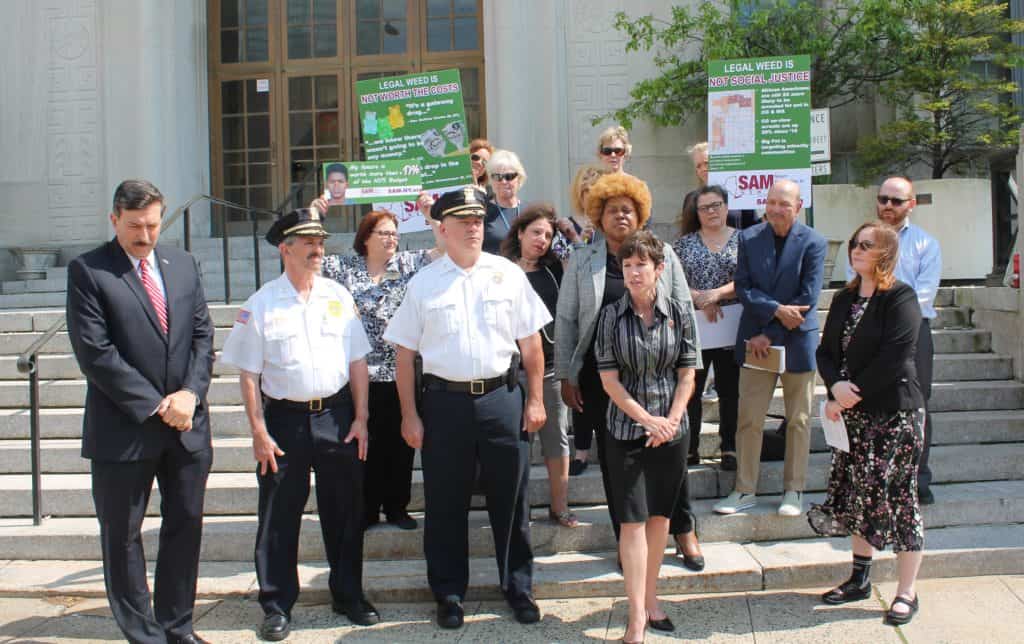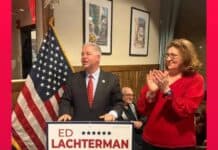
By Dan Murphy
SAM-NY, Smart Approaches to Marijuana, held a press conference outside the county office building in White Plains, joined by Westchester leaders, concerned parents, addiction treatment specialist and medical professionals to call on the county to opt out of commercial marijuana. Also in attendance were local police chiefs and two county legislators – Republican Minority Leader John Testa and Conservative Legislator Margaret Cunzio.
Legislator Nancy Barr, who was also there to join Testa and Cunzio, was a last-minute cancelation but is assumed to also oppose legal pot in Westchester.
“I worry about what this will do to our local police departments,” said Cunzio, chairwoman of the BOL Committee on Public Safety. “Are the dollar signs worth the cost of public safety?”
Testa said legalization of pot will be “the most irresponsible and reckless decision that New York will make for children and for police, who have concerns about enforcement. I’m proud to join this organization to stop this from happening,” he said. “Where marijuana has been legalized, it has been a disaster, and as a former high school teacher I have concerns for students on the high school level.”
Mount Pleasant Police Chief Paul Oliva, who is head of the Westchester Chiefs of Police Association, added: “We are opposed based on concerns for public safety and public health. There is currently no roadside test available (to test for marijuana). The results will be that the roads will be less safe in Westchester. There is no way to determine THC levels without a blood test. We are not in favor and urge the county to opt out.”
Yonkers’ four county legislators have yet to give their opinion on legalizing the sale of marijuana. Westchester, and every county in New York State, can opt-out of legalizing the sale of marijuana, and the City of Yonkers can, too.
Or, Westchester County could opt-out and Yonkers could opt-in, making it the only community in the county to legalize the sale of pot.
Currently, no Yonkers elected officials – including Mayor Mike Spano, have taken any public position on legalizing pot or permitting its sale in the city. All are waiting for the state to take action on legalization first, including County Executive George Latimer.
Gov. Andrew Cuomo has called for the Senate and Assembly to vote on legal pot next month, before they take their summer recess, but many believe that no vote will be taken this year. Cuomo recently commented: “When the Legislature starts to say, ‘We need the governor to get us votes,’ that’s legislative code for ‘We don’t have the votes.”
One Yonkers elected official told Yonkers Rising: “If the state legalizes marijuana sales and Westchester opts out, then New Yorkers can go to the Bronx, or wherever it is legal, make their purchase legally, and come back to Westchester. All we are losing is the tax revenue.”
As the State Legislature and Cuomo delay their decision on whether to legalize the sale of marijuana in the Empire State, New Yorkers are not waiting for the outcome. Instead, they are traveling across the border to Massachusetts to purchase pot, edibles, and other varieties of cannabis in retail stores.
The argument by some groups in New York opposed to legalizing marijuana, that legalization will have detrimental health, public safety and societal impacts, is weakened if New Yorkers can travel by car for about an hour to find a state, and a location, that sells pot.
Under Massachusetts law, New Yorkers age 21 and older can buy legal weed, extracts and edibles at their dispensaries – even though pot is still illegal in New York. And records show that more than 25,000 New Yorkers have traveled to buy pot in Massachusetts at several locations – the closest one being in Great Barrington, at Theory Wellness, which is less than a two-hour drive from Westchester.
Massachusetts charges a 17 percent tax on all pot sales, and local governments add on another 3 percent. Estimates have the state collecting $200 million in sales tax on more than $1 billion in sales from marijuana dispensaries.
Having marijuana legal in Massachusetts, and not legal in New York, is similar to when the drinking age was 18 in some states and 21 in others, which had younger drinkers traveling to the state with the lower drinking age until the federal government nationalized a drinking age of 21.
One thing that both sides can now agree on is to support the decriminalization of small amounts of possession of pot. County Legislator Christopher Johnson, from Yonkers, supported that measure, and Westchester District Attorney Anthony Scarpino’s office now does not prosecute low-level pot possession charges.
SAM-NY also supports decriminalization.





